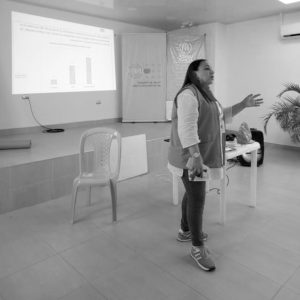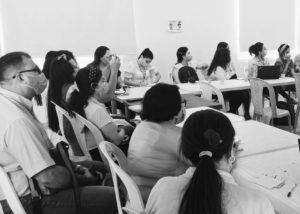
iMMAP and the Gender-Based Violence (GBV) Area of Responsibility conducted a joint mission to Arauca on March 28 and 29, with main two aims. The first was to establish a network of safe spaces for the GBV AoR, for which iMMAP and GBV AoR coordinated with agencies on the ground. The second was to roll out the GBV AoR’s pilot in the city of Arauca, which would serve as an articulating mechanism that will allow the methodology to be repeated in other territories. These two main objectives were underpinned by key components that cannot be overlooked: the impact on communities, proximity to beneficiaries, and on this occasion, the women who inspire us more and more to continue building and improving the quality of life
Entrepreneurship and knowledge have been harnessed to confront these grave situations, so that women begin to realize and recognize themselves as women, as people with rights. On this occasion, three women told us about their experiences of how they have turned their lives around, which they described in their own words as: "taking the blindfolds off". These stories also aim to highlight what they have brought to their communities. “quitarnos las vendas de los ojos”. Estas historias tienen el propósito de resaltar lo que aportan ellas a sus comunidades.

The first woman who wanted to share her testimony was Karen Melendez, a female head of household who lives in one of the settlements of Arauca with her three children. Today she is recognized as a woman empowered by knowledge, after having been a survivor of gender-based violence and has now been attending workshops and trainings for three years. As a community leader, she is responsible for sharing her knowledge and experiences, and above all, providing a mechanism for women’s voices to be heard. These lessons have even helped her to reconcile with her family, where ties were broken. Proud of her present, unafraid of what happened to her as a survivor, having endured various kinds of violence, not only from her ex-partner, but also at work and in general because of being a female head of household. Her message is one of respect, both for rights and the freedom to make decisions about our bodies and life.
Next, we spoke with Malanyel Castellanos, a single mother of four children. In 2019, Malanyel began her process of empowerment and training. Today she is dedicated to inspiring other women who were also assaulted through workshops, hoping that someday these women share the message and become leaders themselves. Her message to other women is to face fear and internalize the existence of possibilities, and that everyone has a choice, saying with her llanero accent: "up to here I allow myself to be violated... up to here I allow myself to be abused". This message is also accompanied by the importance of not giving up, of moving forward, that training and learning play a vital role in putting aside fear and starting to act. They are not facing situations alone, as she says: "put aside the "I can't", of course we can! We all can". “hasta aquí permito que me violenten… hasta aquí permito que me abusen”. Mensaje que también viene acompañado de la importancia de no rendirse, de seguir adelante, que la formación y el aprendizaje juegan un papel muy importante para dejar de lado el miedo y empezar a actuar, porque no están solas en cualquier situación que están enfrentando, como ella lo dice: “ dejar de lado el no puedo, ¡claro que podemos! Todas podemos”.
The last woman we had the opportunity to talk to was Gloria, at her request and for the protection of her identity, we changed her name and did not show her face. She is a survivor of attempted homicide by her ex-partner. Today, after psychological counseling and some training, she feels free because her fear has abated. She is able to go out in the street and no longer feel alone. For the moment she is still in training, but hopes to be able to give workshops to other women in the future. Although her journey is ongoing, Gloria sends a strong message to women who are in danger: “ask for help and get out of there, you have to put a lot on your part but whatever the situation there are always ways out.” Gloria is still building a new life and on the path to overcoming 20 years of violence, including 4 homicide attempts. She thanks God and the women who have helped her in her process, before saying goodbye with a big hug. pidan ayuda y salgan de allí, hay que poner mucho de su parte pero cualquiera que sea la situación siempre hay salidas. Gloria sigue construyendo una nueva vida y todavía en camino a la superación después de 20 años de violencia entre lo que cuenta 4 intentos de homicidio, agradece a Dios y a las mujeres que le han ayudado en su proceso, luego procede a despedirse con un fuerte abrazo.
Regarding our conversations with the three female survivors of violence who shared a bit of their history with us, we would like to add that it is important not to fall into revictimization by constantly reliving situations of violence. Nevertheless, the fact that GBV exists should not be swept under the carpet. This experience showed us that the sense of sisterhood and resilience in the territory is lived differently. It is built up and strengthened as more women teach, especially teaching girls and adolescents to use their powerful voices to prevent violence and internalize that rights are respected, and dignified life is open to all in the community.
